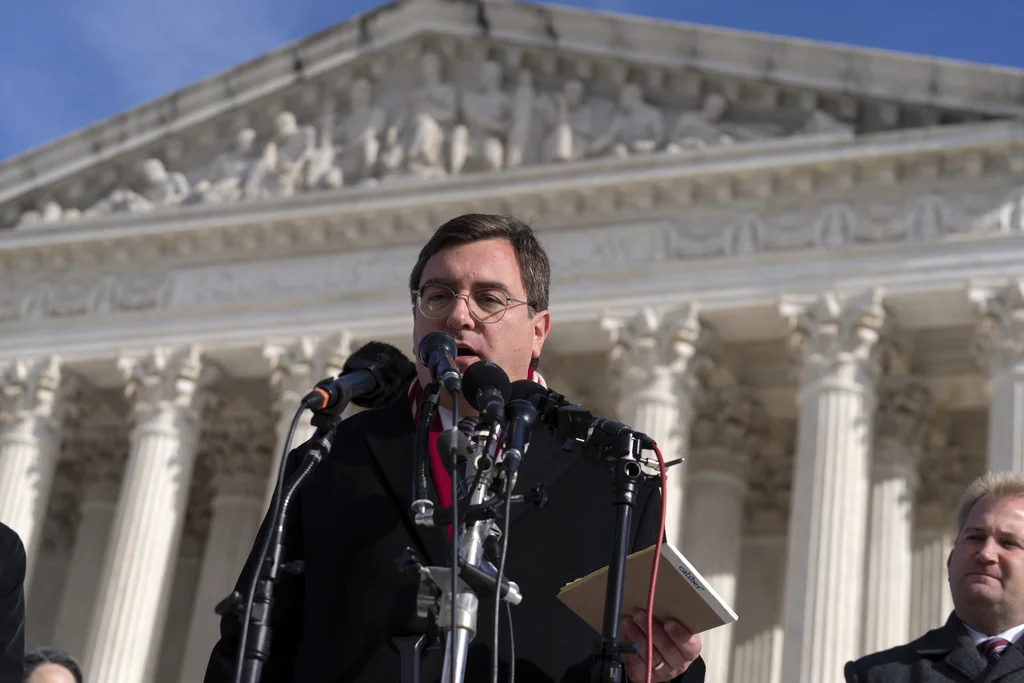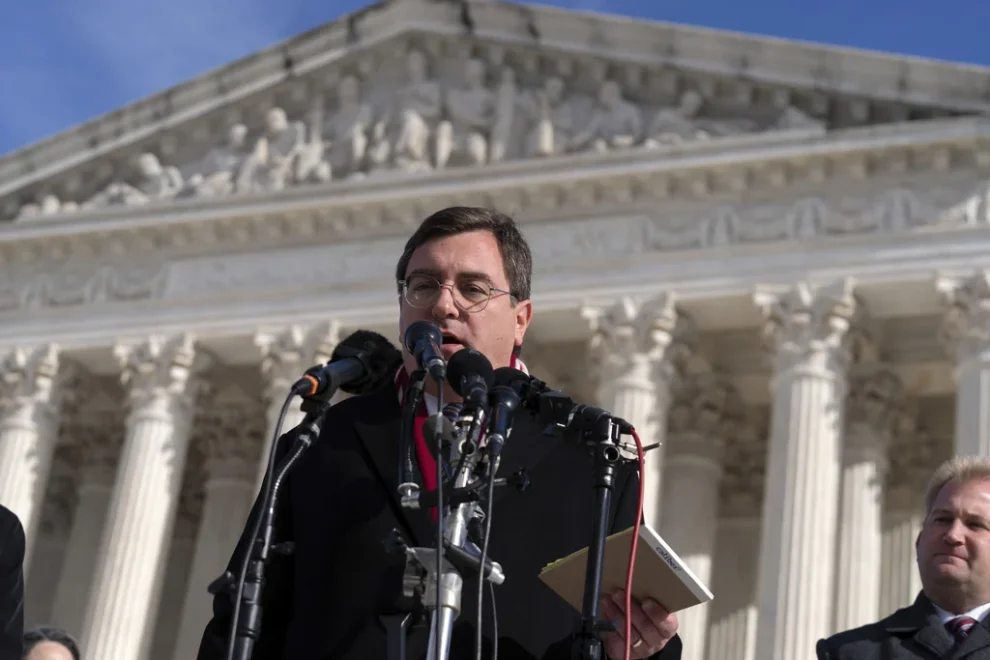The Supreme Court’s ruling this week upholding the Tennessee ban on transgender medical procedures for minors is rapidly transforming legal battles across the country, handing state lawmakers a sweeping win and signaling a new judicial standard that restricts the reach of gender identity claims under the Constitution.
In United States v. Skrmetti, the justices ruled in a 6–3 decision handed down Wednesday that Tennessee’s Protecting Children from Gender Mutilation Act — which bans the use of puberty blockers, hormone treatments, and surgeries intended to help minors identify as the opposite sex — does not violate the 14th Amendment’s Equal Protection Clause. Rejecting the Biden administration’s arguments, the high court applied the lower “rational basis” test, affirming that states have broad authority to regulate experimental medical procedures.

Writing for the majority, Chief Justice John Roberts emphasized that Tennessee’s law targets age and medical diagnosis, not transgender status or sex. “SB1 satisfies rational basis review,” he wrote. “There is any reasonably conceivable state of facts that could provide a rational basis for the classification.”
And as Tennessee Solicitor General Matt Rice emphasized, the ruling restores a core constitutional balance.
“The Court rejected the notion that the Equal Protection Clause somehow institutionalizes one side’s view of an active medical debate,” Rice told Washington Watch host Tony Perkins, who represented the state of Tennessee under the office of its Attorney General Jonathan Skrmetti (R), the namesake of the case.
The high court “instead reinforced a fundamental principle… that the power to resolve these types of political decisions rest with the democratic process.”
Similar challenges see immediate impacts after high court ruling
The ruling at the high court this week had immediate consequences. Within hours, Idaho Attorney General Raúl Labrador (R) announced that plaintiffs had voluntarily dismissed a federal challenge to the state’s Vulnerable Child Protection Act, clearing the way for full enforcement of the law.
“No one has the right to harm children,” Labrador said. “Idaho’s law protects kids from experimental procedures with lifelong, irreversible consequences.”
West Virginia Attorney General J.B. McCuskey (R) said the ruling would likely help his office prevail in two pending legal battles: one upholding a law that bars biological males from competing in girls’ sports (BPJ v. West Virginia State Board of Education), and another defending the state’s refusal to fund sex-change procedures under Medicaid (Anderson v. Crouch).
“Today’s decision affirms that we have a duty to enact laws to protect our children,” McCuskey said. “Based on this ruling, we are developing our next steps and hope to have movement in these two cases soon, with the hope that common sense will once again prevail.”
DOJ and Trump administration stand to reap benefits
The Trump administration’s Department of Justice has also swiftly aligned with the Supreme Court’s ruling. Civil Rights Division chief Harmeet Dhillon called the decision a pivotal development for restoring the rights of parents and children in the face of what she described as a sweeping ideological push.
A little tour of the @CivilRights conference room and the latest from our team today — meeting with law enforcement, unpacking Skrmetti, preparing cases against educational institutions, working up voting cases, and more! pic.twitter.com/prHyMoVfKc
— AAGHarmeetDhillon (@AAGDhillon) June 19, 2025
“We’ve been unpacking the very important Skrmetti decision out of the United States Supreme Court,” Dhillon said Thursday. “It’s very important for advancing the protection of parental and children’s rights vis-à-vis transgender ideology sweeping this country. I think that’s going to have some really long-lasting repercussions for the country and for the work that we’re doing here at civil rights.”
The DOJ is currently defending a slate of Trump administration executive orders and agency actions that direct federal departments to define “sex” on the basis of biological reality rather than gender identity. Those orders restrict funding for gender-transition procedures, roll back Obama-era rules under Section 1557 of the Affordable Care Act, and reinstate previous guidelines for sex-based accommodations in schools, prisons, and the military. Legal challenges are ongoing in multiple federal jurisdictions.
Bostock extends no further than 2020 ruling’s intended applications
The Supreme Court’s opinion in Skrmetti was a completely separate issue compared to its oft-cited 2020 ruling in Bostock v. Clayton County, which held that Title VII of the Civil Rights Act protects workers from discrimination based on sexual orientation and gender identity.
While Bostock was celebrated by LGBT activists at the time as a landmark win, the Supreme Court in Skrmetti made clear that its employment-focused reasoning does not automatically extend to other legal contexts — particularly state laws concerning medicine and children.
“We have not yet considered whether Bostock’s reasoning reaches beyond the Title VII context,” Roberts wrote, “and we need not do so here.”
He illustrated that the Tennessee law would prohibit both a female who identifies as a boy and a biological girl with a different diagnosis from receiving testosterone treatment. In both cases, the law does not hinge on transgender status or sex, but rather on diagnosis and age, undermining the claim that the law discriminates.
Justice Sonia Sotomayor, writing in dissent, took the opposite view — arguing that Bostock supports a broader reading of sex discrimination that would invalidate the Tennessee law. “As Bostock outlined… it is impossible to discriminate against a person for being homosexual or transgender without discriminating against that individual based on sex,” she wrote.
But unlike in 2020, this time the Supreme Court’s Republican-appointed members — including Justice Neil Gorsuch, the author of Bostock — declined to push its logic any further. Justice Amy Coney Barrett wrote separately to stress that “transgender status” is not immutable in the same way as race or sex, and thus does not deserve heightened scrutiny. Justice Clarence Thomas reiterated his disagreement with Bostock altogether, calling it a flawed decision from the start.
Possible impacts on pending Supreme Court petitions
While Skrmetti settles a key constitutional question on equal protection grounds, new battles are already looming over due process, federal benefits, and parental rights.
Most immediately, the Supreme Court is considering whether to take up two closely related cases: L.W. v. Skrmetti and Doe 1 v. Commonwealth of Kentucky ex rel. Cameron. Both raise the question of whether the Fourteenth Amendment’s due process protections grant parents the right to secure transgender procedures for their children. The cases, which have been rescheduled for conference over 13 times, were set to be reviewed on Friday during the justices’ closed-door conference.
If the high court grants certiorari, vacates, and remands these cases in light of Skrmetti, lower courts will be tasked with deciding whether parental autonomy extends to securing irreversible medical interventions that have been rejected or restricted in multiple countries overseas.
Those cases could then become the next national flashpoints in defining the limits of both gender ideology and parental control under the Constitution.
A distinction between federal and state court battles
A large swath of similar challenges to bans on transgender procedures for minors currently in lower courts stand to be affected by the high court’s ruling, depending on whether those cases lie in federal or state courts.
- Alabama and Georgia: Challenges were withdrawn following favorable 11th Circuit rulings for the states both this year and last year.
- Kentucky, Florida, Indiana: Federal appeals courts upheld these respective state laws prior to Skrmetti.
- Arkansas: Awaiting review by the 8th Circuit after a rare permanent injunction. Arkansas was the first state to pass a law of this nature.
- Oklahoma and North Carolina: Lawsuits stalled pending the Supreme Court’s decision.
Additional lawsuits against state measures to bar transgender procedures for minors are underway in Montana, Texas, Missouri, Ohio, and Kansas, though Skrmetti has sharply tilted the legal terrain in favor of the states. And in at least nine others — including Iowa, South Dakota, South Carolina, Wyoming, and Mississippi — no legal challenges have been filed at all.
Still, Skrmetti may have a lesser impact on state courts interpreting their own constitutions. While Skrmetti provides strong federal precedent, state courts may reach different conclusions depending on how they interpret parental rights, medical autonomy, and privacy under their own constitutions.
SUPREME COURT UPHOLDS TENNESSEE BAN ON TRANSGENDER PROCEDURES FOR MINORS
For example, on Dec. 11, the Montana Supreme Court upheld a preliminary injunction in Cross v. State of Montana, ruling under state constitutional grounds. Similarly, cases such as Loe v. Kansas (filed May 28) and Soe v. Louisiana State Board of Medical Examiners, filed in January 2024, are still pending decisions and may not be directly affected by Skrmetti.
With the new precedent now on the books, the power to legislate has shifted decisively back to voters and legislatures, and away from courts that for years had treated a minor’s gender preference as a uniquely privileged category.
























